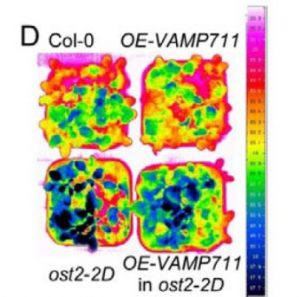A SNARE Protein that Regulates Plasma Membrane H+-ATPase activity
 The plant hormone abscisic acid (ABA) plays an important role in plant drought responses. Previous studies have indicated that ABA inhibits plasma membrane H+-ATPase (PM H+-ATPase) activity, and the resultant decrease in PM H+-ATPase activity promotes stomatal closure under drought stress, thereby reducing water loss. However, the underlying molecular mechanisms are not well understood. Based on their studies of Arabidopsis thaliana, Xue et al. (10.1104/pp.18.00499) report that ABA induces a SNARE protein, namely, VESICLE-ASSOCIATED MEMBRANE PROTEIN 711 (VAMP711) that interacts with the Arabidopsis PM H+-ATPases AHA1 and AHA2. SNARE proteins play an essential role in vesicle trafficking by facilitating the fusion of vesicles and the target membrane in eukaryotes. The inhibitory interaction of VAMP711 with the PM H+-ATPases occurs at the regulatory C-termini of the PM H+-ATPases. Deletion of VAMP711 in Arabidopsis results in a higher PM H+-ATPase activity and slower stomatal closure in response to ABA or drought. In addition, overexpression of VAMP711 partially rescues the drought-sensitive phenotype of ost2-2D, a mutation in AHA1 that results in a constitutive activation of that PM H+-ATPase. These results demonstrate that VAMP711 is involved in regulating ABA-mediated inhibition of PM H+-ATPase activity and stomatal closure in response to drought stress.
The plant hormone abscisic acid (ABA) plays an important role in plant drought responses. Previous studies have indicated that ABA inhibits plasma membrane H+-ATPase (PM H+-ATPase) activity, and the resultant decrease in PM H+-ATPase activity promotes stomatal closure under drought stress, thereby reducing water loss. However, the underlying molecular mechanisms are not well understood. Based on their studies of Arabidopsis thaliana, Xue et al. (10.1104/pp.18.00499) report that ABA induces a SNARE protein, namely, VESICLE-ASSOCIATED MEMBRANE PROTEIN 711 (VAMP711) that interacts with the Arabidopsis PM H+-ATPases AHA1 and AHA2. SNARE proteins play an essential role in vesicle trafficking by facilitating the fusion of vesicles and the target membrane in eukaryotes. The inhibitory interaction of VAMP711 with the PM H+-ATPases occurs at the regulatory C-termini of the PM H+-ATPases. Deletion of VAMP711 in Arabidopsis results in a higher PM H+-ATPase activity and slower stomatal closure in response to ABA or drought. In addition, overexpression of VAMP711 partially rescues the drought-sensitive phenotype of ost2-2D, a mutation in AHA1 that results in a constitutive activation of that PM H+-ATPase. These results demonstrate that VAMP711 is involved in regulating ABA-mediated inhibition of PM H+-ATPase activity and stomatal closure in response to drought stress.



